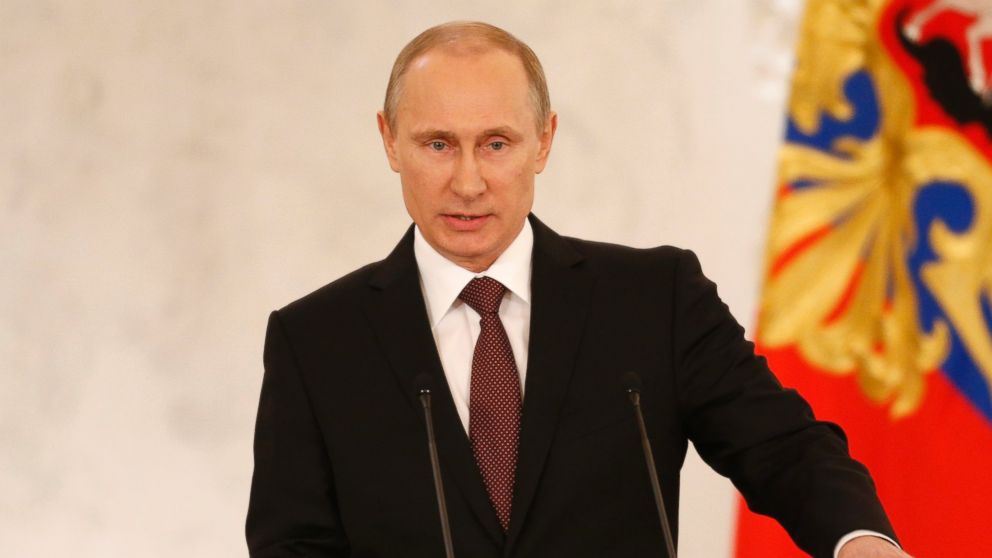
Putin’s Crimea Speech: A Manifesto of Greater-Russia Irredentism
Publication: Eurasia Daily Monitor Volume: 11 Issue: 56
By:

Russian President Vladimir Putin’s speech on the incorporation of Crimea into Russia (kremlin.ru, March 18; see EDM, March 19) aimed far beyond Crimea in scope and ambition. Explicitly, Putin called into question the legitimacy of the Ukrainian state. Implicitly, he laid a basis for challenging the post-1991 status quo elsewhere in the former Soviet-ruled area.
His starting premise is the denial of a Ukrainian nationhood in its own right: “We are not just close neighbors, we are essentially, as I have said more than once, a single people.” With this as a premise, Ukraine’s sovereignty and borders become fluid at one stroke. Normal European good-neighborly relations are excluded; instead, “fraternal” relations as Russia defines them are historically pre-determined from this perspective.
Putin’s previous iterations of this view were rare and phrased as insinuations, stopping short of challenges to borders and territorial integrity. Now he has crossed this threshold. Putin de-values independent Ukraine’s integrity by tracing it to the Union of Soviet Socialist Republic’s (USSR) internal constitutional arrangements, as if ignoring the post-1991 international recognition of Ukraine’s borders: “The Bolsheviks—let God be their judge—incorporated considerable parts of Russia’s historical south into Soviet Ukraine, without taking account of the ethnic composition of those regions, and now this is the present-day southeast of Ukraine.”
In Crimea’s case, furthermore, the territory’s transfer in 1954 from the Russian Soviet Federated Socialist Republic (RSFSR) to the Ukrainian SSR “was a decision made in clear violation of the constitutional norms that existed even then,” according to Putin—hence, a valid grounds for Russia to reclaim Crimea 60 years later from an independent Ukraine. He also invokes a historic right of conquest: Russian soldiers died in order to “bring Crimea into the Russian state in 1783.”
The Kremlin can extend this logic to other parts of the former Soviet domain, circumstances permitting. Northern Kazakhstan’s case lends itself potentially to a similar manipulation of history. The thesis that the Soviet government had illegitimately allocated Russian-inhabited territories to non-Russian republics (see above) can be recycled by the Kremlin with regard to Kazakhstan in almost the same terms as in Ukraine’s case. Russia’s annexation of Crimea and proposals to “federalize” Ukraine are probably viewed in Kazakhstan as potentially dangerous precedents. Yet, Kazakhstan’s government has acknowledged the Crimean referendum as valid, and received Russia’s subsequent “decision” [unspecified] “with understanding” (Kazinform, March 18). Whether this was a result of Russian intimidation behind the scenes, coupled perhaps, with an erosion of confidence in the West’s capacity to respond effectively, is something that Kazakhstan’s Western partners need to understand more clearly.
Moldova is also vulnerable to an application of Putin’s doctrine, on two counts. First, if Russia’s right of conquest goes back to 1783 in Crimea, it similarly goes back to 1791 in Transnistria. That conquest serves as an argument for perpetuating Russia’s military presence there, transcending Russia’s “peacekeeping” operation in that part of Moldova. Second, from a Russian irredentist perspective, Transnistria provides another example of “Russian-speaking” territories being assigned to non-Russian union republics within the Soviet Union.
That irredentist perspective is now Putin’s: “The Russian people became [in 1991] one of the biggest, if not the biggest, divided nation in the world,” he declared in the March 18 speech. This implies that reclaiming Crimea is only a first step in a grander design of repairing what Putin terms the “crying historical injustice” of 1991. The view of Russia as a divided nation entitled to territorial acquisitions for its reunification was, until quite recently, the view of Russia’s nationalist circles, operating mostly outside the government, and often in opposition to it. Putin has now turned it into the Kremlin’s official view. This view also resembles Serbian leader Slobodan Milosevic’s thesis about the Serbian nation as a “divided nation,” entitled by virtue of “historical injustice” to reclaiming territories from Yugoslavia’s former constituent republics.
At no point in his speech does Putin acknowledge the post-1991 status quo as legitimate. Instead, his arguments about Ukraine—and the potential applicability of those arguments elsewhere—are forcing the discussion out of the existing international system and back into the context of a Russian sphere of authority. The message in Putin’s speech is that international law no longer operates in Russia-Ukraine relations. Russia had already removed international law from its relations with Georgia (explicitly) and with Moldova (implicitly) since the 1990s. Now, Ukraine vastly enlarges the area over which Russia claims overriding decision-making powers. Putin deems the current Ukrainian government illegitimate because it aligns itself with the West “against both Ukraine [sic] and Russia, against integration into the Eurasian space.”
Having made the case for Russia as a “divided nation,” Putin appeals to Germany for understanding. Seemingly addressing German public opinion, but in reality the government, he hopes “above all that the Germans will understand me. Russia unambiguously supported the Germans’ striving for national unity. I am confident that you have not forgotten this, and I hope that German citizens will also support the striving of the Russian world, historical Russia, to restore its unity.”
Inadvertently or otherwise, this analogy implies that Russia would erase some borders and unify some territories with its own, albeit through the Kremlin’s own methods, not those of Germany’s reunification. The Kremlin defines the “Russian world” as encompassing large areas of the former Russian and Soviet empires. Crimea is only a small part of this “Russian world.”




